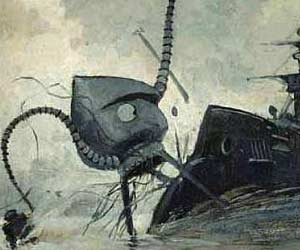The War in the Air
Select Format
Select Condition 
Book Overview
At the beginning of the twentieth century the invention of the airplane revolutionizes warfare and precipitates a devastating world war. Nations race to build armadas of airships; cities across the globe are bombed; flying navies clash above the Alps and India. The United States is invaded from the east and the west. German and American airships duel over the Atlantic, and New York is bombarded by German flying machines. Confederation of Eastern Asia...
Customer Reviews
The century of total war
Wonderfully forward-thinking, but somewhat bloated
Stunning, disturbing prophecy
H.G.Wells is a great author...
A LESSER-KNOWN WELLS MASTERPIECE
The War in the Air Mentions in Our Blog

A hundred years ago, novelist H.G. Wells predicted that science would be "king of the world." Titanic's Jack Dawson may take issue with that claim, but he’d have a tough time disputing the compelling influence Wells had on politics, society, and the future that extended far beyond the literary realm. Considering Wells is one the founding fathers of sci-fi (along with Jules Verne and Edgar Rice Burroughs) and the author of The Time Machine, The Invisible man, The Island of Dr. Moreau, and The War of the Worlds, that's saying something.





